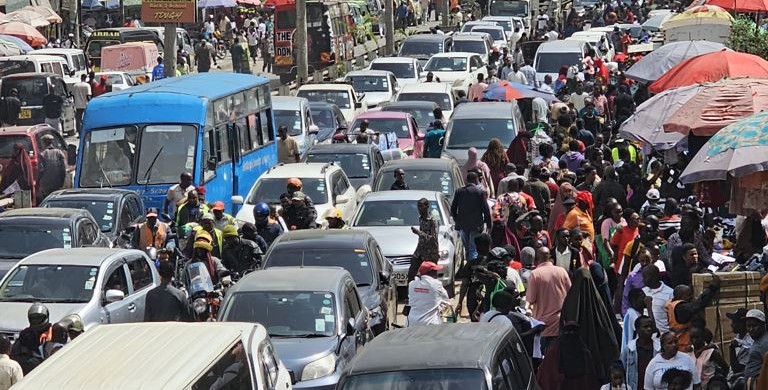Racing the clock: How Nairobi life makes you an unstoppable timekeeper

Whether navigating crowded streets or managing a side hustle, time in Nairobi is not just a concept; it is a precious resource in high demand.
The saying "No hurry in Africa" no longer seems to apply in Nairobi.
In a city where the clock never seems to stop ticking, living in Nairobi transforms its residents into masterful timekeepers; from chaotic traffic jams to fast-paced streets and a high-energy work culture, Nairobi is a place where every minute counts and time management is not just a skill here, it is a survival tool.
More To Read
- Over 150 illegal fuel dens in Industrial Area demolished in major multi-agency operation
- Earth tremor reported in Nairobi and surrounding areas
- In Eastleigh’s Somali cafés, spiced milk coffee is a sip of home and heritage
- MPs demand swift completion of Likoni Road bridge in Nairobi which has stalled for 3 years
- Human Rights Watch demands release of report on probe of Kware murders
- President Ruto pledges Sh5 million for renovations at Nairobi’s Zawadi Primary School
Whether navigating crowded streets or managing a side hustle, time in Nairobi is not just a concept; it is a precious resource in high demand.
For anyone who has lived here, mastering time is not only necessary, but it also becomes an art form that can be used to benefit you greatly.
Nairobi, the heartbeat of the nation, is home to millions of people, all hustling to make the most of every opportunity. But with those opportunities comes fierce competition, and the city’s fast-paced lifestyle demands its residents keep up, or risk being left behind and going back to the rural areas. It’s a true “survival of the fittest” scenario.
In the city’s bustling streets, time becomes an ever-elusive commodity that you simply cannot afford to waste. And it is in this environment that Nairobians have learned to become the ultimate timekeepers. They constantly optimise, prioritise, and balance every moment.
Traffic gridlock
One of the biggest challenges in Nairobi is the infamous traffic, where people often spend hours stuck in gridlock. For those living in the city, it is an unavoidable part of life. But instead of getting frustrated, Nairobians have learned to adapt and make the most of it.
Grace Wambui, a marketing manager who has lived in Nairobi for over ten years, knows this all too well. She has mastered the art of navigating the city’s traffic.
“You just learn to plan your day around the traffic,” Grace told the Eastleigh Voice.
“I know when I need to leave for meetings, and I always give myself extra time, just in case the traffic surprises me.”
For Grace, it is about managing expectations. She does not hope for the traffic to get better or expect an easier ride. She knows delays will happen, so she adjusts accordingly.
“I know that on Mondays through Wednesdays, traffic is crazy, so I leave home early. Over the years, this constant practice of anticipating delays has become second nature. It’s almost like a game of strategy,” she explains.
This approach to time management helps Grace not only survive the chaos of Nairobi but also keep her stress levels in check.
“Once you accept that delays are part of life, you learn to adapt,” she says.
Many Nairobians, like Grace, have become experts in managing their time amid the traffic storm.
But Nairobi’s time crunch does not stop with traffic.
The city’s vibrant informal sector means many residents juggle multiple roles daily. Balancing full-time jobs with side hustles or small businesses has become the norm.
Multiple income streams
David Mwangi, a tech entrepreneur, explains: “In Nairobi, you don’t just work one job. You’ve got to have multiple streams of income, and that means managing your time carefully.”
From drivers to students, market vendors to tech professionals, the pressure to maximise every second is universal.
“I know a friend who works at a construction site during the day and is a watchman by night,” Mwangi says.
Managing multiple responsibilities forces people to prioritise ruthlessly, making them better time managers in every aspect of their lives.
This balancing act has made Nairobians incredibly skilled at multitasking and time-blocking.
“If you have a meeting, you’re likely making calls or checking emails in between,” Mwangi adds.
Human clocks
People become human clocks, constantly shifting gears to make the most of every moment. The city’s service sector also runs on tight schedules.
Whether ordering food through delivery apps or a ride from Uber or Bolt, timing is critical. Despite the erratic public transport and clogged roads, punctuality is key.
“Punctuality is everything,” says Mwangi.
“If you’re late, you risk losing customers and damaging your reputation. And once a customer notices you’re slow, or you open your business late or at unpredictable times, you’ll lose them.”
This sharp focus on punctuality sharpens the time-awareness of Nairobians. They become quicker decision-makers, able to recalibrate their priorities in an instant.
“When you take a matatu, the driver usually speeds, ignoring traffic rules, and sometimes even drives on the pavement to avoid the jam. Everyone knows the saying ‘time is money,’ so passengers get used to it. When the matatu gets close to their stop, they quickly stand up and line up before it even stops. The conductor shouts ‘Haraka haraka!’ urging everyone to get out fast.”
For Nairobians, time management has become a key skill in the professional world.
Balance competing demands
Employers across various industries value employees who can balance competing demands and meet deadlines without fail.
Time management has emerged as one of the top soft skills employers look for in Nairobi.
For many, learning to juggle work, family, and personal commitments while staying ahead of the clock is what defines success in the city. And because the city operates at such a high tempo, residents quickly adapt and become better timekeepers by necessity.
“If you’re not in control of your time, the city can overwhelm you,” says Janet Wambui, a phone store operator in Nairobi’s CBD.
“Being efficient is great, but you also need to manage the stress that comes with it. Nairobi can grind you down if you don’t know when to take a step back and recharge.”
The key to survival is not just managing time; it is managing energy, too.
“You learn when to push forward and when to take a break,” she says.
This awareness is something Nairobians develop over time. They understand that while the race against time is real, so is the need to rest and recharge, so weekends and off days are eagerly anticipated.
Time management lessons
For young professionals entering Nairobi’s workforce, the city’s fast pace offers crucial lessons in time management. But it also teaches them the importance of balance. While the hustle encourages them to stay ahead, it also forces them to recognise that mental and physical well-being are just as important as the ticking clock.
“It’s not just about getting things done; it’s about how you do them,” says Mwangi.
“Managing your time is just as important as managing your stress levels. Finding this balance makes you a more efficient and sustainable timekeeper in the long run.”
In Nairobi, the daily grind is relentless, with the city’s rush hour in the CBD, people prefer running errands between 10 am to 3 pm, where the rush is not as chaotic.
People rush through errands, eat quickly, and expect others to do the same.
The expectation to be on time at work, to leave exactly when the workday ends, to walk fast, and to have a well-planned schedule at home has become part of life.
Schoolchildren
Even parents find their schedules affected as they rush to pick up children, plan around school timetables, and ensure everything happens according to plan because one small delay affects the entire schedule.
"People in the city often walk quickly as a safety measure, particularly to avoid becoming targets for pickpockets. They tend to carry their bags in front of them, remain alert, and avoid engaging in conversations or greetings with strangers. This fast pace helps them stay vigilant in busy areas where theft can occur." Mwangi says.
The timekeeping culture in Nairobi is ingrained in both work and home life, creating an environment where time becomes a precious commodity.
Even with the challenges, the skills Nairobians develop, balancing work, family, and personal commitments while managing stress, are powerful assets that will serve them for a lifetime.
In the end, Nairobi’s fast-paced lifestyle may be one of the city’s toughest challenges, but it also teaches invaluable lessons in time management, prioritisation, and self-discipline.
Whether waking up early to beat traffic or attending back-to-back meetings, Nairobians have become more than just clock-watchers; they are experts in making every minute count.
Top Stories Today












































